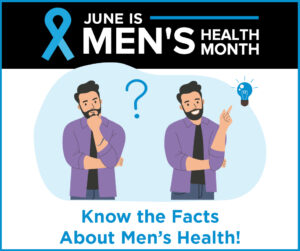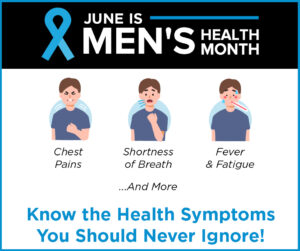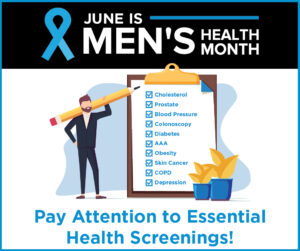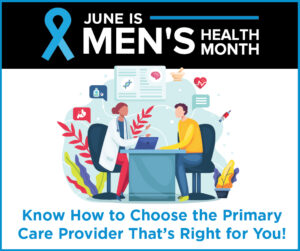June is Men’s Health Month! In this article, we look at some basic men’s health facts, symptoms that should never be ignored, appropriate screenings for optimal wellness and prevention, and what to look for when choosing a primary care physician.
 Know the Facts
Know the Facts
Q: How much of a man’s health is determined by genetics? How much by lifestyle choices?
A: Approximately 30 percent of a man’s health is determined by genetics, which a much greater 70 percent is often directly affected by daily lifestyle choices.
Q: What is the leading cause of cancer deaths in mean?
A: Lung cancer is number one. Prostate cancer ranks second.
Q: Can I man get breast cancer?
A: Though it is rare in men, the answer is absolutely yes. There is certainly a risk for any man to develop breast cancer.
Q: Is osteoporosis something men have to worry about?
A: Women are more likely to develop osteoporosis (low bone density), but men can also be subject to the disease. In fact, certain genetic dispositions and lifestyle choices can actually increase the risk of osteoporosis in some men.
Q: Does alcohol intake affect a man’s weight?
A: Excess calories from beer or certain cocktails can increase belly fat and cause overall weight gain.
Q: Is a man’s risk of death from heart disease greater if he’s showing symptoms?
A: The truth is that roughly half of men who die suddenly from heart disease actually showed NO previous symptoms. This is just another reason why men, in general, should schedule an annual wellness exam for preventative measures, and keep up-to-date with important recommended screenings.
 10 Symptoms You Should Never Ignore
10 Symptoms You Should Never Ignore
Ignoring certain symptoms can lead to an ER visit or hospitalization, two situations that everyone wants to avoid. If you experience any of these 10 symptoms, see your doctor as soon as possible.
- A Persistent High Fever: Having a fever is an indication that your body is fighting an infection. A fever above 103˚ or a fever that lasts more than three days could be signs of a serious infection.
- A Cold That Becomes Severe: See your doctor if your cold doesn’t go away or develops a severe cough that lasts more than two weeks, a fever, muscle aches or other flu-like symptoms, extreme difficulty swallowing, chest pain, or shortness of breath.
- Sudden Weight Loss: If you lose more than 10 percent of your body weight in six months (and you’re not obese), it could be a sign of an overactive thyroid, liver disease, depression or other medical conditions.
- Shortness of Breath: This could be a sign of asthma, bronchitis or another medical condition that affects the lungs, especially if the symptoms are strong and come on suddenly.
- Severe Chest, Abdominal or Pelvic Pain: All of these symptoms immediately demand a doctor’s attention. Chest pain could indicate a heart attack. Pain in the abdomen can be a sign of gallstones, especially if there’s nausea and vomiting. Pelvic pain could indicate a kidney infection or appendicitis.
- Changes in Bowel Movement or Urination: These can include bloody or black stools, diarrhea, constipation or excessive urination.
- Unexpected Symptoms After a Procedure of Starting a New Medication: Before you have a medical procedure or surgery, get an immunization, or start a medication, be sure you understand the known symptoms. Call your doctor if you experience something unexpected.
- A Recent Fall: If you’ve fallen on your head or suffered a blow to the head, you need to watch for signs of a concussion. Symptoms include headache, confusion, lack of coordination, memory loss, nausea, vomiting, dizziness, ringing in the ears, sleepiness and fatigue. If you experience any of these, you need to seek medical attention immediately.
- Confusion or Changes in Mood: Trouble thinking or focusing, irregular sleep patterns, or feelings of anxiety or depression can be the sign of a mental health issue or an infection or drug interaction.
- Bright Flashes of Light: If you’re experiencing sudden bright flashes of light in your vision, it could be a sign of retinal detachment, a serious condition that requires immediate medical attention to prevent permanent vision loss.
 10 Essential Health Screenings for Men
10 Essential Health Screenings for Men
- Blood Cholesterol (age 35): All men 35 and older should have their blood cholesterol checked regularly. Men with any of the following conditions should begin checking at age 20: tobacco use, high blood pressure, diabetes, being overweight or obese, or a history of heart disease or heart attack.
- Prostate Screening (age 40): Prostate cancer is the most common type of cancer in American men except for skin cancer. The decision to have a prostate screening should be made after a discussion with your healthcare provider about your risk factors, starting at age 40.
- Blood Pressure (age 40): High blood pressure is the biggest risk factor for heart disease, the leading cause of death for men in the United States. Have your blood pressure checked each year, starting at age 40.
- Colonoscopy (age 45): Due to the increase in the number of colon cancer cases in recent years, all men should now be screened for colorectal cancer (colon or rectal) starting at age 45.
- Diabetes Screening (age 45): All men should be screened for diabetes at least every three years starting at age 45. Men who have high blood pressure or take medication to control their high blood pressure should get screened more often.
- Abdominal Aortic Aneurysm (age 65): Men between the ages of 65 and 75 who have smoked at any point in their lifetime should have this screening. The major risk of an aortic aneurysm is a rupture that leads to sever or fatal bleeding.
- Obesity: Your Body Mass Index (BMI) is a reliable indicator of whether your weight is at a healthy level. A BMI above 25 is considered overweight and a BMI greater than 30 is obese, which can contribute to a number of serious health risks.
- Skin Cancer Screening: Skin cancer is the most common type of cancer found in men (and women). Annual screenings are recommended and should be increased in frequency if skin cancer or pre-cancerous cells are found.
- COPD: Symptoms of COPD (Chronic Obstructive Pulmonary Disease) include a chronic cough, shortness of breath and frequent respiratory infections. People with COPD have an increased risk of heart disease and lung cancer. A simple lung function test or a chest X-ray can provide a diagnosis.
- Depression: Don’t ignore your mental health. Six million men suffer from depression each year. Talk to your healthcare provider about getting screened for depression if you suffer any of these symptoms for more than two weeks:
- Significant change in appetite or sleeping patterns
- Loss of interest and motivation in formerly enjoyable activities
- Feeling hopeless, worthless, sad or irritable
- Inappropriate feelings of guilt
- Difficulty focusing or thinking
 Choosing a Primary Care Provider
Choosing a Primary Care Provider
According to the Mayo Clinic, men over 50 years of age should have a yearly physical exam, and men under 50 should have a physical exam every three to five years. The reason is simple and straightforward. Having a regular physical, also known as a wellness exam, increases the chances of both preventing a disease and detecting it early when treatment is much more effective.
It’s important to feel comfortable with any health decision you make, so here are a few key things to keep in mind when looking for a primary care provider:
- Find a Provider Who Meets Your Needs: There are three types of primary care physicians. Family Practice physicians treats patients of all ages. This might be a good choice if you have children and want your entire family to receive care from the same doctor. Internal Medicine physicians typically treat only adults. This is a good choice if you have multiple or chronic medical conditions. General Practice physicians are like Family Practice physicians. They can treat patients of any age or gender.
- Find a Provider With Whom You Are Comfortable: Having a good relationship with your primary care provider is important. After all, you want someone who is trustworthy and a good communicator. That’s why it’s good to meet with the doctor and his or her care team before making a decision.
- Build a Relationship: Establishing an ongoing relationship with a primary care provider offers many benefits. Knowing your family and medical history helps your primary care provider better understand your symptoms and health concerns and perhaps make a more precise diagnosis. By monitoring your health over time, your doctor is better equipped to notice small changes that may be signs of a larger problem.
- Do Not Forget Preventive Exams and Screenings: Be sure to talk to your doctor about scheduling regular health screenings, such as a colonoscopy and prostate tests. After the test results are received, your doctor can follow up and determine the best next course of action for your health. And if you do need additional medical attention, your provider can coordinate your care and refer you to the right medical specialist or therapist and then actively monitor your health status.
- Be Flexible: 61 percent of men said they would be more likely to have an annual physical if seeing the doctor was more convenient. If that’s the case for you, consider scheduling a telehealth visit, making an appointment outside of work hours, or attending a local health screening event.
- Be Honest: The more your primary care provider knows about your health, the better they can take care of you. Yet 20 percent of men say they have not been completely honest with their doctor.
- Do Not Wait Until Something Goes Wrong: Many people wait until the last minute or until something is definitely wrong with their health before seeking help. That’s not the right move. A good rule of thumb is to seek help if your symptoms last more than two weeks.
- Check Your Insurance: If you have health insurance, make sure your primary care provider is an in-network provider with your plan.
The Bottom Line
A visit to your primary care provider almost always costs less than a visit to an urgent care clinic or the emergency room. Sometimes the cost savings can be hundreds, even thousands of dollars. A good way to think about having a wellness exam is comparing it to routine maintenance on your car. You don’t wait to take your car in for service until it needs a total engine replacement. You change the oil and have routine engine checkups to keep the car running safely and to prevent a major, costly repair. It is the same with your body.
Preventive screenings and regular wellness exams will keep your body healthy and help avoid more costly surgeries and treatments in the future. So, why wait? Take action now, and live your life for healthier tomorrows!
Sources: WebMD, Cardiology Associates of Michigan, Link Health and Community, Houston Methodist Hospital, Mayo Clinic, Cleveland Clinic
